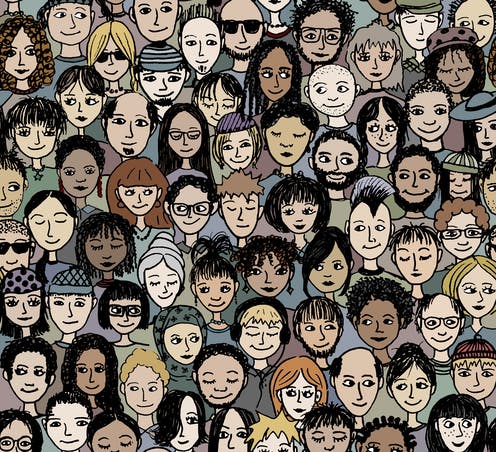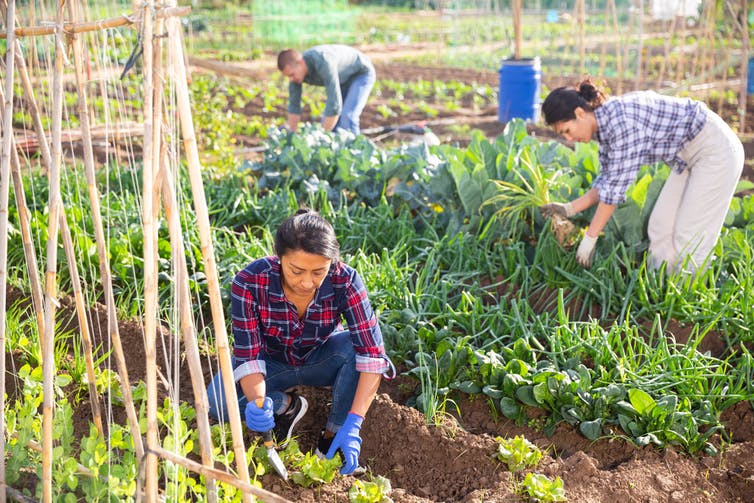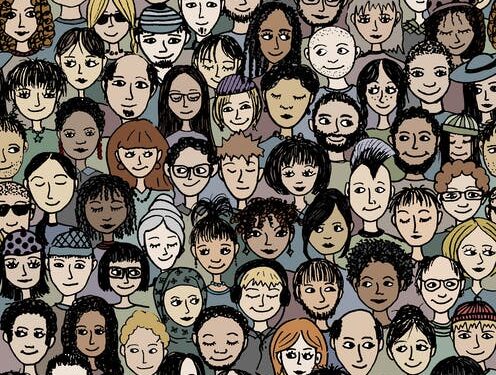
Franzi/Shutterstock
The World Health Organization (WHO) describes mental health as “a state of well-being in which an individual realises his or her own abilities, can cope with the normal stresses of life, can work productively and is able to make a contribution to his or her community”.
In its definition, the WHO emphasises the importance of environment and community for mental health and wellbeing, and that they should be promoted and protected. But the fact remains that mental health and wellbeing are mostly seen as states of individuals.
A different view might start from a sense that wellbeing is social: people need social connections to thrive. But it also means recognising that social institutions and organisations systemically affect health and suffering. Institutional racism and sexism, for example, contribute to suffering in both direct and indirect ways.
Health and illness are at once deeply personal and affected by the social situation of the sufferer. In other words, depending on their circumstances or their place within the society, some people are distinctly at a disadvantage. Being poor, for example, puts people’s health at risk in a multitude of ways.
My work explores the concept of wellbeing in different cultural settings across the world. In my latest research, I reviewed work by anthropologists who consider the importance of conviviality and care in the communities they study.
Table of Contents
Community and conviviality
Conviviality refers to the art of living well together. Researchers see it as particularly important for understanding how people in certain small communities strive to live well when state institutions and other organisations are a relatively remote presence in their lives.
Many Amazonian peoples, for example, strive to live well by caring for others in their community, by sharing resources and cultivating particular emotional conditions such as tranquillity. Close and intimate bonds are created through sharing food; one becomes kin by eating together, or estranged by eating apart.
Until a few decades ago, when many Japanese houses did not have a bathroom, neighbourhood communal baths were abundant. Even now, bathing with friends or family members is not unusual, with the communal bathhouse offering a much-needed space for socialising and reconnecting.
Living well with others requires skilful effort in modern cities, especially, perhaps, where neighbourhoods are made up of people of different backgrounds. It also entails figuring out how to live with other species – from animals and plants to even the microbes living in our gut.

BearFotos/Shutterstock
Care makes us who we are
In my own research with older Japanese people in the city of Osaka, I observed that although caring for ageing relatives is still a strong family value, many older people were worried about growing increasingly dependent and a burden on their children.
They were active in providing care themselves, and looking out for one other in all kinds of ways, from arranging a visit to the dentist to recommending a hairdresser. It became clear that various forms of care worked in interconnected ways: looking after elders and children required looking after mothers, who were often the carers for both. Care, I concluded, is at its best in circulation, continually being “paid forward” between people in numerous ongoing relationships.
Conviviality and care draw our attention to the fact that wellbeing is not only social, but deeply relational. It is not simply what an individual feels about their life, somehow enclosed within a body. It plays out in the relationship with one’s surrounding environment: with materials, with tools and technologies, with human and non-human beings.
The way we think about these relationships affects others and their wellbeing and health, which in turn reflects on us. Witnessing the suffering of others, for instance, or living in a deteriorating environment, is likely to affect us negatively.
It is not inconceivable that our current mental health crisis is intertwined with our witnessing of large-scale suffering and neglect of humans, nonhumans and the natural world. Treating mental health as internal, or as pertaining only to the individual, may be inadequate for addressing these kinds of issues.
We not I
How then to think about wellbeing in the context of environmental crisis and rising inequalities? We need to start treating wellbeing as a process of connecting with others – or even a form of “commons”.
Commons refer to resources used collectively and shared, like water. Similarly, the emotional or “affective” resources (such as resilience, friendship or care) that promote wellbeing do not merely pertain to individuals, but emerge in relationships, spaces and communities. Unlike scarce resources such as trees or urban spaces, wellbeing and the qualities that underpin it are not finite. Like the care between generations of Japanese families, they thrive in circulation.
A good example is hope. Being faced with hopelessness can be trying, while surrounding ourselves with optimistic people might make us more hopeful. In this sense, affective states like optimism can be contagious. Who we surround ourselves with matters. Perhaps it’s time to think of wellbeing as a commons that we must cultivate together: the more it thrives for others, the more it benefits us.
![]()
Iza Kavedžija's research has been funded by the AHRC.
























